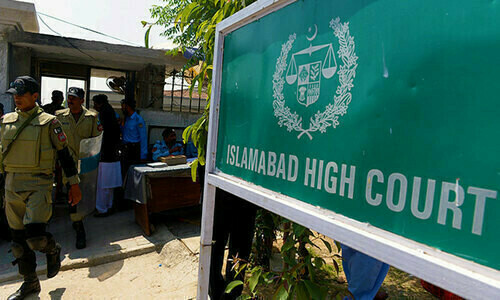BAGHDAD, Aug 6: Washington’s envoy in Baghdad delivered a warning on Saturday to Iraq’s Shia leaders not to use a new constitution to impose ‘discriminatory laws by majority rule’. A day after talks between Prime Minister Ibrahim Jaafar and Ayatollah Sistani had revived fears among Sunnis and Kurds of an Iranian-style Islamic state, ambassador Zalmay Khalilzad said Washington insisted a draft constitution due out this month must respect equal rights for women and minorities.
It was a clear public signal of US determination to steer the new Iraq after months of behind-the-scenes negotiation. On the eve of a much-anticipated meeting of Iraqi leaders that aims to break the deadlock on key issues, including the role of Islamic law, the US envoy said in a statement he had met — unnamed — representatives of religious and ethnic minorities:
“I assured them that the United States believes strongly that the Iraqi constitution should provide equal rights before the law for all Iraqis regardless of gender, race, ethnicity, religion or sect ... There can be no compromise.”
He went on: “Tomorrow the Iraqi leaders begin to meet to finalize the draft constitution.
“I am hopeful that as these leaders gather and as the final document emerges they will lay a foundation for a new Iraqi nation where all of its citizens are able to participate and no community is oppressed, marginalised or excluded.”
Shia leaders say they do not want to emulate Iran in imposing clerical rule, which critics say discriminates against women and followers of other faiths. Some Iraqis complain Islamists are already trying to curb personal behaviour such as women’s employment and alcohol sales.
WASHINGTON EYES TEHRAN: Washington, at daggers drawn with Tehran since the revolution of 1979, is also wary of Iranian influence.
But it had previously limited public comment on the drafting of the constitution, anxious not to be seen to be controlling a process it hopes can draw the sting from the revolt, legitimize and strengthen the Iraqi government and let it begin pulling out US troops after an election at the end of the year.
Kurdish and Sunni leaders spelled out key demands ahead of Sunday’s talks at the home of President Jalal Talabani. A prominent Sunni member of the drafting panel, which is due to present its work to parliament by Aug 15, accused Prime Minister Ibrahim Jaafari of tending toward religious rule by meeting Grand Ayatollah Ali al Sistani and telling voters that the ayatollah broadly favoured some of his plans.
“It gives the impression people must follow these opinions, which means clerical rule,” Saleh al Mutlak of the National Dialogue Council said after Mr Jaafari met Ayatollah Sistani in Najaf after Friday prayers. “The Shia religious authority is interfering in political affairs.”
Mr Jaafari said Ayatollah Sistani, who rarely appears in public, had voiced cautious support for some kind of federal structure for the new state — an issue that concerns some Sunnis who fear the encroachment of already autonomous Kurds on northern cities and their surrounding oilfields and Shia control of southern oil.
KURDS STAND FIRM: In the Kurdish parliament, regional president Masoud Barzani assured legislators he would defend their interests in seeking a share of oil, a continued role for their non-Arab peshmerga militia forces and limitations on the scope of Islamic law.
“We should be flexible in negotiations but that does not mean we should haggle over our demands,” said Barzani, who led forces that, with US help, drove out Saddam’s troops in 1991.
Another Kurdish leader, Ghafour Makhmouri, told lawmakers: “All our demands for the panel are red lines that cannot be crossed. We will not soften them. They are our minimum rights.” —Reuters













































Dear visitor, the comments section is undergoing an overhaul and will return soon.